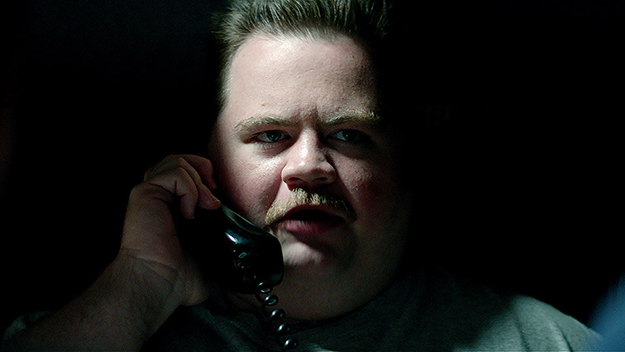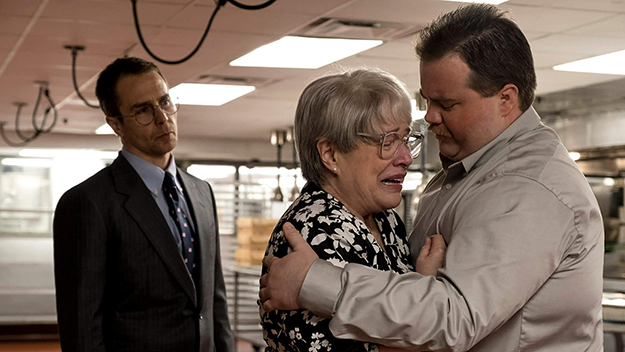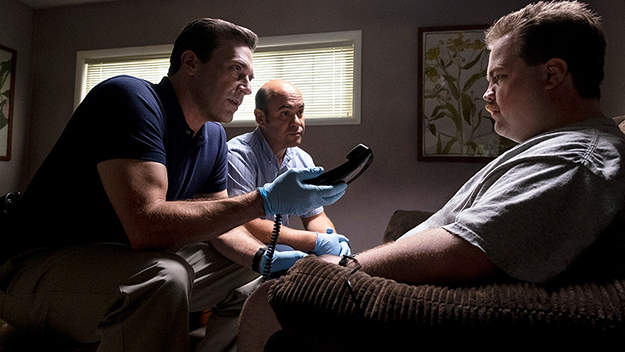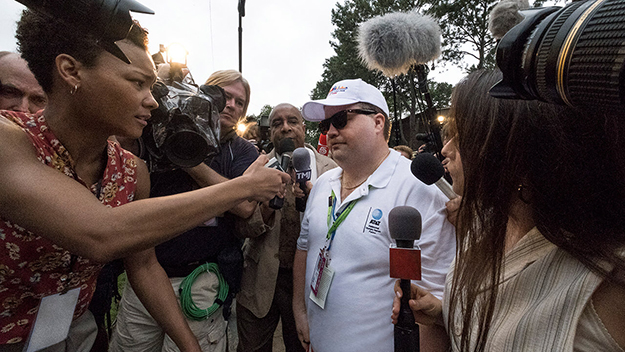Deep Focus: Richard Jewell

Images from Richard Jewell (Clint Eastwood, 2019)
In Richard Jewell, Clint Eastwood stages and times the explosion at Centennial Park during the 1996 Summer Olympics in Atlanta with teeth-rattling impact. The sequence contains some of Eastwood’s finest direction: he lets us drink in the mass picnic atmosphere of a pop/rock concert under the stars while an ultra-vigilant private security guard, Jewell, spots a suspicious-looking backpack under a bench near the park’s light and sound tower. As Jewell pulls in lawmen to investigate the device, we get caught up in his dogged attempts to enforce protocol and save lives, whether by warning and then clearing the tower (in two separate runs) or by helping officers create a perimeter around the “suspicious package.” As in the best parts of Sully, Eastwood captures the hair-trigger tension of professionals executing critical jobs under mortal stress, like the ATF agent who blanches, freezes, and drops his flashlight after he gingerly peeks inside the backpack and sees menacing bomb paraphernalia. (Actor Brian Brightman aces that transfixing bit.) Eastwood and his longtime cutter, Joel Cox, have rarely edited better than in this sequence. They weave in the worrying details, such as the bomber’s 911 threat of a blast in 30 minutes, and the bomb unit’s Render Safe squad being 20 minutes away. They cut between oblivious concertgoers and desperate officers until the device detonates with an abruptness that blows us back into our seats.
But the artist who anchors the sequence—and who keeps this film from collapsing into pandering mediocrity after it devolves into anti-media and anti-FBI caricatures—is Paul Walter Hauser as Jewell. Hauser is so committed to his character’s mulish sense of truth and duty that we see how this untidy man at the bottom of the security team’s totem pole commands ultimate respect from his leaner and more elevated colleagues. He seems to wind up complacent officers and propel them into action with the rolling gestures of his hands. He becomes tragic or tragicomic, not pathetic, when his belief in American justice prevents him from seeing that the FBI wants to pin this terrorist atrocity on him.
The strong early sections of Billy Ray’s script deftly limn Jewell’s unsteady career. As a clerk in the Atlanta office of the U.S. Small Business Administration, he meets his future attorney, Watson Bryant (Sam Rockwell). He charms the lawyer with his ability to anticipate his every need, from adhesive tape to Snickers, as well as his skill at arcade video games. (Bryant nicknames Jewell “Radar” after Gary Burghoff’s thoroughly innocent character in M*A*S*H.) Later, as a cop for Piedmont College, Jewell’s take-no-prisoners approach to the school’s no-alcohol policy, and his decision to stop drivers off-campus, where he has no jurisdiction, antagonize both students and the college president W. Ray Cleere (Charles Green). A few months after Jewell resigns under pressure from Piedmont, Cleere makes a call to the FBI that helps catalyze Jewell’s transition in the public eye from hero to villain.

By the time our hero takes a security job at AT&T’s Olympic Pavilion, Hauser lets us know that Jewell knows that an overweight, single, 33-year-old man, living with his mother Bobi (Kathy Bates), looks like a loser to the outside world. Before he sets out for his shift on July 26, he bemoans the modest apartment where his mom has ended up with her son. On the job, though, he’s all business. Mentally nimble—gauging the urgency of the crisis before anyone else—he moves like a human tank, using his size to push away crowds or to tend to the fallen.
For most of the movie, he soldiers through a daze brought on by aftershocks of celebrity and infamy. Three days after the explosion, the Atlanta Journal-Constitution identifies him as a focus of the FBI’s investigation. FBI profilers and media commentators alike use Jewell’s obsessive love of law enforcement, and his speckled career, to theorize that he planted the bomb so he could discover it and become a “hero.” Still, Jewell can’t resist cooperating with the FBI even after agents strive to trick him into self-incrimination.
Hauser depicts Jewell as a wily bear of a man who’s also a hopeless naif. While journalists swarm in front of their apartment, Bobi complains that the FBI swept up her all Tupperware and her “babysitting tapes”—Disney movies. With excruciating patience, Jewell tells her that the bomber used Tupperware to hold nails, and that her VHS collection could be hiding a mission statement. Bobi berates him for “defending” his antagonists, but Richard doesn’t agree: he’s just “explaining.” Bates draws on bedrock outrage and emotion to create an indignant mom who slices through government obfuscation. Bobi isolates what should be the central question: “What does this have to do with you?” On the other hand, Hauser’s command of Jewell’s unconventional reflexes and psychology, and Rockwell’s snappy portrait of an irreverent and combative lawyer, enable us to experience the film as quirky black situation comedy. (A CNN commentator likened Jewell’s plight in Atlanta to “Kafka in Prague.”) With her tangy facial expressions, Nina Arianda, as Bryant’s Russian-born assistant, adds some warm Slavic drollery of her own. The cohesive interplay between Jewell and his team suggests the strength of Eastwood’s casual approach with actors: when performers grab ahold of their characters, he gets out of their way.

But Eastwood’s limitations nearly sink the film. He’s an erratic filmmaker who keeps one eye on the zeitgeist and who’s an unabashed sentimentalist toward aggrieved white men. It’s no surprise, in the current climate, that his portrayals of journalists and FBI agents are wobbly, sneering, and fallacious. Eastwood commits numerous sins against the memory of Kathy Scruggs (Olivia Wilde), the Atlanta Journal-Constitution scribe who, along with her byline partner, Ron Martz, broke the story that the FBI targeted Jewell. Eastwood’s vilification of Scruggs goes beyond the fictional episode of her bartering sex for information with the FBI’s lead agent on the case, a composite character named Shaw (Jon Hamm). From the moment she caroms into the AJC newsroom, taunting quiet female colleagues with her headline-grabbing bravado and muttering that she may have to get her “tits” done to compete with TV journalists, she’s less a monstre sacré than a sad, desperate character. (The “tits” line is especially foul: the real Scruggs underwent breast reduction to alleviate chronic back pain.)
In Marie Brenner’s typically first-rate Vanity Fair profile, “The Ballad of Richard Jewell,” the primary source for Ray’s screenplay, Brenner criticizes the haste and thinness of Scruggs’s initial reporting while acknowledging her as a “tough” reporter who aggressively worked her contacts. Brenner doesn’t eviscerate her. She notes that Scruggs went to Bryant’s office “to clear up the misunderstanding” over an unfortunate, significant misquotation; after the lawyer said, “I don’t like your reporting,” she responded, “I’m human, too.” (In the movie, Bryant ambushes her in the AJC newsroom.) More important, in 22 pages, Brenner provides the journalistic pressure-cooker context that this two-hour film ignores or elides. Brenner portrays a newspaper in a nonstop identity crisis since the forced resignation of editor Bill Kovach eight years before. She explains that AJC editors ordered reporters to “cover hard news in a short form,” in an assertive voice. “The AJC style of reporting in declarative sentences had a name, too: the voice of God. It was omniscient,” Brenner observes, “because it allowed no references to unattributed sources.” So when Scruggs and Martz write that Jewell “fits the profile of the lone bomber,” without identifying the profilers in any way, it seems to have the authority of scripture.
The new nonfiction book The Suspect, co-written by Kent Alexander, the former U.S. Attorney for the Northern District of Georgia who was key in resolving Jewell’s case, and Kevin Salwen, who was in charge of the Wall Street Journal’s southeastern section during the Olympics, notes that Scruggs’s loud, salty banter and gung-ho attitude made her fans see her “as a delightful throwback to the 1930s newspaper wars.” Wilde may be striving for that retro/nouveau effect in her performance—she probably views Scruggs as an updated, unbuttoned twist on Rosalind Russell in His Girl Friday. But Eastwood lets Wilde go out on a limb, then saws it off behind her. Nothing in the film supports her. When Scruggs’s coworkers clap for her scoop, the applause sounds canned.

Scruggs falls into the usual impure film cliché. This hard-boiled opportunist gets shaken out of her certainty and ultimately sheds tears while she listens to Jewell’s mom speak up for her son. The factual Scruggs rechanneled her energy into covering the hunt for the actual bomber and resisted court orders to reveal her sources. But the stress of Jewell’s defamation suit against the AJC and her constant physical pain wore her down. She died at 42. The cause of death was “acute morphine toxicity.” Jewell, a diabetic, also died young, at 44, of a heart attack. Jewell’s defamation lawyer abandoned his suit against the AJC in 2012, after the Georgia Supreme Court accepted a lower court decision that “the articles in their entirety were substantially true at the time they were published . . . though the investigators’ assumptions were ultimately unfounded.”
Eastwood and Ray never outline the moves and countermoves behind Bryant’s defense of Jewell, which included enlisting other lawyers. In the film, Jewell simply wins the media duel with a big assist from mom. The movie verges on becoming a libertarian fable. A poster in Bryant’s office proclaims that he fears government more than terrorism. Jewell learns to mistrust authority. And the FBI appears to be a snake pit. Has Eastwood ever directed a weaker bad-guy performance than Hamm’s as Agent Shaw? Hamm emits little more than a fetid haze. He can’t make us comprehend any reason for Shaw’s unshakable belief in Jewell’s guilt. (It’s a relief to see Hamm bring intelligence and attack to the slick, elusive role of Obama’s Chief of Staff, Denis McDonough, in Scott Z. Burns’s The Report.)
What keeps Richard Jewell from ending up a screed is Hauser’s inspired performance and the vibrations it sets off in Bates, Rockwell, and Arianda. At the height of the anti-Jewell hysteria, Jay Leno said that Jewell bore “a scary resemblance to the guy who whacked Nancy Kerrigan,” and asked, “What is it about the Olympic Games that brings out big fat stupid guys?” Two years ago, in the raucous, cartoonish I, Tonya, Hauser actually played Tonya Harding’s bodyguard, Shawn Eckhardt. In Richard Jewell, Hauser gives a performance so empathetic and keen that it could rid the world of bad jokes made about big guys by glib comics.
Michael Sragow is a contributing editor to Film Comment and writes its Deep Focus column. He is a member of the National Society of Film Critics and the Los Angeles Film Critics Association.







